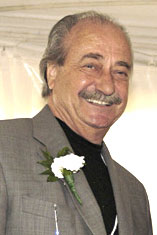Unit offers glimpse of 'centre of Western civilization'

Professor Nikos Metallinos when he was awarded the Concordia Council of Student Life Award for teaching in May 2005.
Dionysus is generally remembered as the ancient god of wine, but he practically invented the drama and was an unremitting promoter of civilization.
Communication Studies professor Nikos Metallinos has much in common with his favourite Greek deity, as Coordinator of the Hellenic Studies Unit.
“The culture is extremely important not just for Greeks, but admirers of Western Civilization in which Greece stands at the centre,” said Metallinos, who founded the unit in 2000.
Hellenophiles can now choose between 18 electives offered in all four faculties as part of the Greek studies cluster. Eventually, Metallinos hopes to establish a Centre for Hellenic Studies and offer an 18-credit minor.
Concordia and Greek studies are a natural fit. “We have an enormous number of students of Greek descent attending Concordia, and a Greek community that is thirsty for these activities.”
The unit’s mandate is threefold: To both preserve and perpetuate Greece’s splendid cultural patrimony, and to develop ties with like-minded organizations.
Its most resounding success so far has been the popular Hellenic Studies lecture series. Metallinos videotapes each discussion, and every year he publishes the transcripts in a monograph. These volumes, which are available for purchase, are collected by scholars of Greek culture, serve as a record of the unit’s activities.
The 2005-06 series begins on Jan. 20 when the unit welcomes Dr. Loukianos Hassiotis of the University of Thessaloniki. He will deliver a lecture entitled “Between Self-Complacency and Cooperation: Greek Policy in South Eastern Europe Mid-Nineteenth to Mid-Twentieth Century.”
This year’s series, Greece and the Balkans: A Reappraisal, explores Greece’s role as the most prosperous country in one of Europe’s most strife-ridden regions. It is the only Balkan nation to have membership in both the European Union and NATO. Consequently, relations with many of its neighbours are being redefined.
“If Turkey were to gain membership in the EU, the Greeks would really like it, because as a condition, Turkey would be required to recognize the autonomy of Cyprus,” Metallinos said.
The Consul-General of Greece in Montreal, George Zacharioudakis, will attend the Jan. 20 lecture, and the winner of $1,000 Arnopoulos Scholarship will be announced at the end of the evening.
Like Dionysus, Metallinos is a thespian at heart. During his youth, he participated in over 100 productions with the Greek National Theatre, 37 of which were great classical dramas, such as Oedipus, Elektra and Antigone.
His interest in Greek theatre, dance and literature was sparked at the Modern School of Theater Arts of Greece, where he received his BA. He earned another BA as well as his MA at San Francisco State University. He completed his PhD in Communications at the University of Utah.
During his work and travels in North America, he has founded five Greek Cultural Groups on this continent, including Montreal’s Hellenic Cultural Institute. He particularly adores traditional Greek dancing, and is an experienced instructor.
“If you are cursed with being Greek, you just can’t relax,” he laughed. “When you go to any university in the world, open a textbook and realize what the Greeks have achieved, you have to do something about it.”
The series continues on March 3 and May 5 with lectures by Dimitri Keridis, of Boston’s Tufts University, and André Gerolymatos, from Simon Fraser University. All lectures are free, and start at 7 p.m. in H-767.